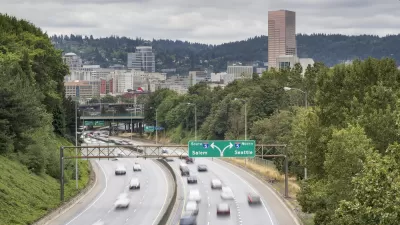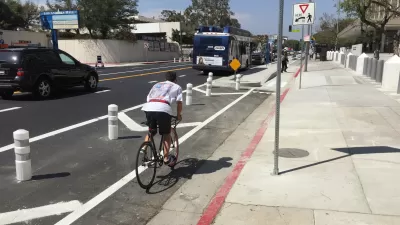A new report stresses the importance of international cooperation on low-carbon development.

The New Climate Economy recently issued a working paper outlining the economic benefits of carbon-saving investment in a rapidly urbanizing world. The report provides a cost-benefit analysis of investment in three primary areas: energy efficiency for buildings, a robust transportation system, and improved waste management. "The finding upends the notion that it is too expensive to do anything about climate change – or that such efforts would make little real difference," writes Suzanne Goldenberg.
The lowest-hanging fruit, according to the report, is transportation. Investing in public transit and improving vehicle fuel efficiency can have net benefits even for cities facing the highest political and economic barriers. "Most cities face significant indirect costs and real structural obstacles to making strategic long-term investments, given their short-term political cycles and limited legal/fiscal powers. Fast-growing cities in the developing world face additional challenges, as population growth compounds existing service and infrastructure deficits." However, the costs of doing nothing are substantial. A 2009 transportation research study estimated congestion costs in Beijing to be as high as 15 percent of GDP.
With the next UN conference on climate change scheduled for November, the report calls on world leaders to cooperate to develop best practices, share knowledge and coordinate policy that aid cities, which are the primary agents of change. There is not a one-size-fits-all prescription, as costs and benefits will vary by city, but the report emphasizes the effects that planning have on mitigating or exacerbating carbon pollution. "For example, despite similar wealth levels and population sizes, Atlanta’s carbon footprint is more than five times higher than Barcelona’s due to past transport infrastructure and planning decisions," the paper states.
The recommendation offered is this: "The Global Commission on the Economy and Climate therefore recommends that all cities commit to developing and implementing low-carbon urban development strategies by 2020, using where possible the framework of the Compact of Mayors, prioritising policies and investments in public, non-motorised and low-emission transport, building efficiency, renewable energy and efficient waste management."
FULL STORY: Climate-smart cities could save the world $22tn, say economists

Alabama: Trump Terminates Settlements for Black Communities Harmed By Raw Sewage
Trump deemed the landmark civil rights agreement “illegal DEI and environmental justice policy.”

Planetizen Federal Action Tracker
A weekly monitor of how Trump’s orders and actions are impacting planners and planning in America.

The 120 Year Old Tiny Home Villages That Sheltered San Francisco’s Earthquake Refugees
More than a century ago, San Francisco mobilized to house thousands of residents displaced by the 1906 earthquake. Could their strategy offer a model for the present?

Ken Jennings Launches Transit Web Series
The Jeopardy champ wants you to ride public transit.

BLM To Rescind Public Lands Rule
The change will downgrade conservation, once again putting federal land at risk for mining and other extractive uses.

Indy Neighborhood Group Builds Temporary Multi-Use Path
Community members, aided in part by funding from the city, repurposed a vehicle lane to create a protected bike and pedestrian path for the summer season.
Urban Design for Planners 1: Software Tools
This six-course series explores essential urban design concepts using open source software and equips planners with the tools they need to participate fully in the urban design process.
Planning for Universal Design
Learn the tools for implementing Universal Design in planning regulations.
Clanton & Associates, Inc.
Jessamine County Fiscal Court
Institute for Housing and Urban Development Studies (IHS)
City of Grandview
Harvard GSD Executive Education
Toledo-Lucas County Plan Commissions
Salt Lake City
NYU Wagner Graduate School of Public Service





























